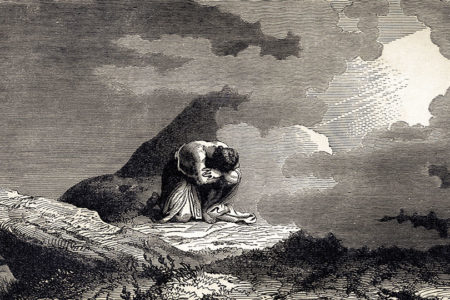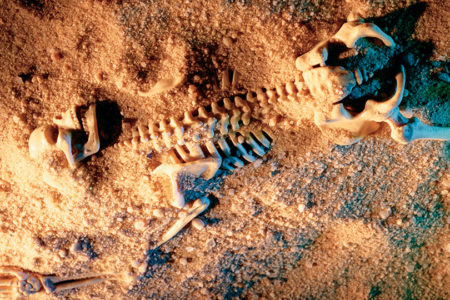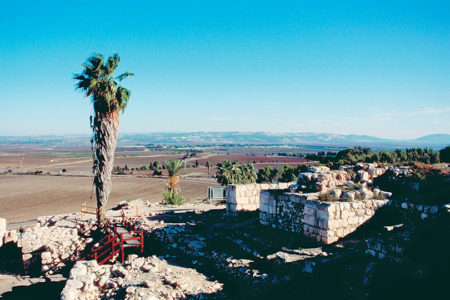Nineveh’s Demise
Nahum 3:1-19
Assyria’s unrelenting violence, extortion, and brutality are well documented in the records of its history. More important, however, God kept track of such savagery; and He judged it.
In chapter 3 Nahum continued his vivid description of God’s destruction of Nineveh and the reasons for it.
Deceitful
Nahum pronounced a series of woes, or warnings, concerning Nineveh: “Woe to the bloody city! It is all full of lies and robbery; the prey departeth not” (v. 1).
Nineveh was a corrupt city of blood. Assyria’s cruelty is amply documented on unearthed cuneiform tablets. Assyrian kings even boasted of their cruelty. Prisoners were impaled alive, flayed, beheaded, or dragged to death with ropes attached to rings that pierced their bodies. They were blinded by the king’s own hand and hung by their hands or feet to die slowly. Others had their brains beaten out or their tongues torn out and were left to bleed to death. Still others had the bleeding heads of the slain tied around their necks while waiting their turn to be tortured.
These atrocities are similar to those Saddam Hussein reportedly inflicted during his rule as president of Iraq.
Nahum also said Nineveh was full of “lies and robbery” (v. 1). Assyria deliberately deceived other nations. It would enter into binding treaties that it had no intention of keeping. Once the Assyrians gained the confidence of another nation, they would break their treaty with it and demand tribute from its leadership.
The word robbery means to “rend in pieces.” It denotes a wild beast tearing its prey to pieces and connotes the type of deceit, violence, and bloodshed that Assyria used against the nations it conquered. Their “prey departeth not” (v. 1) means Assyria never stopped functioning like such an animal in plundering other nations.
Depraved
Nahum provided a detailed description of Nineveh’s collapse as the Medo-Babylonian coalition attacked the city. In verses 2 and 3 the battle is already in progress. As the machinery of war rolls through Nineveh, there is the sound of whips cracking, wheels clattering on the stone pavement, horses galloping through the city, and chariots jostling each other for position as they speed through the streets. The sun’s reflection off the swords and spears strikes terror in the Ninevites as they try in vain to flee from imminent slaughter. The invading army and the people of Nineveh stumble over the thousands of corpses that fill the streets during the battle.
Nineveh was destroyed because she practiced the crimes of religious prostitution and witchcraft. Nahum said, “Because of the multitude of the harlotries of the well-favored harlot, the mistress of witchcrafts, that selleth nations through her harlotries, and families through her witchcrafts” (v. 4).
Nineveh is portrayed as a beautiful prostitute standing in the public square. Like a prostitute, the city is decked in all its meretricious finery. Nineveh used her natural charm; and in so doing, she enticed and seduced other nations into her diabolical religious system. This is an apt picture of Ishtar, the goddess of sex, fertility, and war. Nineveh used the tactics of a prostitute to lure surrounding nations into her control. She used her glamour, beautiful palaces and temples, mighty army, fabulous wealth, and imposing art and architecture to tempt nations to their destruction.
But God saw everything and pronounced sentence: “Behold, I am against thee, said the LORD of hosts, and I will uncover thy skirts from thy face, and I will show the nations thy nakedness, and the kingdoms thy shame” (v. 5).
For the second time in as many chapters, God revealed His opposition to Nineveh and vowed to punish her fully (cf. Nah. 2:13). Her disgraceful acts against other nations will cause God to disgrace her. The Lord will throw Nineveh’s “skirts” over her face, exposing her to the world, stripped of her pride and glory.
Worse yet, God said, “And I will cast abominable filth upon thee, and make thee vile, and will set thee as a gazing-stock” (v. 6). Assyria would parade its captives through the city—sometimes nude—while people pelted them with stones and garbage. Thus God will visit the same ignominy on Nineveh. It will be treated like a naked harlot, fastened to stocks in the public square, and pelted with human excrement. Assyria, in fact, was disgraced and degraded before the world in the worst kind of humiliation.
All who look on Nineveh in its degradation will flee from the city and say, “Nineveh is laid waste; who will bemoan her? Where shall I seek comforters for thee?” (v. 7). Gazing on Nineveh’s horrible appearance will make the nations shrink back in horror. And no one will show sympathy for or have pity on Nineveh; no one will step forward to comfort her.
Defenseless
When Nahum prophesied of Nineveh’s doom, there was no hint of its coming destruction. The city was strong, self-confident, and recognized for its splendor by the surrounding nations. Nahum asked,
Art thou better than populous Noamon [Thebes], that was situated among the rivers, that had the waters round about it, whose rampart [defense] was the sea, and her wall was from the sea? Ethiopia and Egypt were her strength, and it was unlimited; Put and Lubim were thy helpers (vv. 8–9).
Thebes was located on both sides of the Nile River, surrounded by moats, canals, and water channels providing great defense against an invading army. It was the most powerful city in Upper Egypt. Confederating with Ethiopia, Put (present-day Somalia) and Lubim (Libya) appeared to guarantee Thebes’s safety from invading armies. Yet it fell to the Assyrians under Ashurbanipal in 663 B.C.
Nahum described the fate of Thebes:
Yet was she carried away, she went into captivity; her young children also were dashed in pieces at the top of all the streets; and they cast lots for her honorable men, and all her great men were bound in chains (v. 10).
This is exactly what the Assyrians did to the people of Thebes. They murdered innocent children, divided up their leaders and hauled them off in chains, and marched the survivors to Nineveh as slaves.
Thus God will force Nineveh to drink the same cup of terror she had poured out on Thebes: “Thou also shalt be drunk; thou shalt be hidden, thou also shalt seek strength because of the enemy” (v. 11). During the attack the Ninevites will reel to and fro, disoriented like a drunk in a stunned state, because of the calamity overtaking their city. Nineveh will be so completely destroyed that it will be “hidden” or vanish from the face of the earth. While being attacked by the Medo-Babylonian coalition, Nineveh sought “strength,” or protection, from surrounding nations, but found none.
In the remaining verses, Nahum described the process of Nineveh’s eventual destruction.
Nineveh’s defenses will be weak: “All thy strongholds [fortifications] shall be like fig trees with the first-ripe figs; if they be shaken, they shall even fall into the mouth of the eater” (v. 12). Nineveh, ripe for the taking, will fall to the invaders like spring figs shaken from a tree.
Nineveh’ s defenders will be women: “Behold, thy people in the midst of thee are women; the gates of thy land shall be set wide open unto thine enemies; the fire shall devour thy bars” (v. 13). Those left to defend the city were either women or men who were weak, afraid, and powerless, acting like women. Those guarding the city fled, leaving the country wide open to attack. During the conflict the bars on Nineveh’s gates were destroyed, allowing the enemy to flood into the city.
Nineveh’s workmen will work in vain: Nahum taunted the determined workmen, bidding them to do everything possible to spare the city:
Draw thee waters for the siege, fortify thy strongholds; go into clay, and tread the mortar, make strong the brickkiln. There shall the fire devour thee; the sword shall cut thee off, it shall eat thee up like the cankerworm. Make thyself many like the cankerworm, make thyself many like the locust (vv. 14–15).
No matter what the people do to help Nineveh, whether it be gathering water to drink, repairing the city walls, or increasing the army, nothing will save them. The invaders will devour everything in their path like a swarm of locusts.
Nineveh’s wealth will disappear: “Thou has multiplied thy merchants above the stars of heaven; the cankerworm spoileth, and flieth away” (v. 16). Nineveh’s traders and merchants were many, like the stars of heaven. And Nineveh’s wealth, gathered from worldwide conquest and trade, would vanish like locusts stripping an area of its vegetation and quickly flying away.
Nineveh’s disloyal warriors will vanish during the conflict: “Thy princes [guards] are like the locusts, and thy captains like the great grasshoppers, which camp in the hedges in the cold day, but when the sun ariseth they flee away, and their place is not known where they are” (v. 17).
Locusts hide in hedges for protection in cold weather, but they quickly fly away when warmed by the sun. In like manner, Assyria’s guards and military officers will hide from attacking soldiers and quickly flee in the heat of battle.
Nineveh’s leadership will die in the war: “Thy shepherds [political and military leaders] slumber [die], O King of Assyria; thy nobles shall dwell in the dust; thy people are scattered upon the mountains, and no man gathereth them” (v. 18).
With the leadership destroyed, Nineveh’s people will be scattered and never restored to their land.
Nineveh’s demise will delight the world: “There is no healing of thy bruise, thy wound is grievous; all that hear the report of thee shall clap the hands over thee; for upon whom hath not thy wickedness passed continually?” (v. 19).
Destroyed
Nineveh later suffered a “fatal wound” and died. None brought aid to the dying city. Upon hearing of Nineveh’s destruction, nations rejoiced, especially Israel, because they had continually experienced Assyria’s sadistic savagery and subjugation. God destroyed the capital city of this tyrannical and bloodthirsty people, and it was never rebuilt.
God was longsuffering with Nineveh in the days of Jonah, giving the nation time to repent. Nineveh did repent and was spared. But one hundred years later it returned to its sinful ways. Assyria’s inhumane practices, so graphically described by Nahum, met with God’s wrath and judgment. The lessons in the book of Nahum need to be heeded by other nations. For all nations that turn a deaf ear to God’s warning will suffer a similar fate as Nineveh.








It is interesting to consider that Jonah was, at least in his own mind, justified for not wanting to go to a people as “bad” as Nineveh. We might make it about being disobedient to God, but this wasn’t just a personal prejudice against Nineveh.
Studying Jonah and the importance of Nineveh — Through all of this – today we need to be wary of all that is going on – even in the United States. We need to heed God’s warning and wake up and stand firm.
Thank you for the article – very good